Top 10 Reasons Why to Invest in Vietnam
In the late 70ís to 80ís, Vietnam was in an economic downturn due to the negative effect that was due from the 20-year Vietnam War. But then something changed. In 1986, Vietnamese government introduced ďDoi Moi? a series of economic and political reforms, and steered the country to becoming a "socialist-oriented market economy" Doi Moi have transformed Vietnam from one of the poorest nations in the world to a middle-income country with great achievements within less then forty years.
Nowadays, Vietnam is becoming one of the top countries that attracts the most foreign investors to set up their asset or planning to radiate their product out by investing in Vietnam. It has one of the fastest-growing, most vibrant economies in all of Asia, and even compatible world widely. In the 2019ís Global Competitiveness Report by the World Economic Forum Vietnam ranked 67th out of 141 economies in the World Economic Forumís Global Competitiveness Index 2019, being the champion of the most drastic hike country among all countries whose score improves the most globally.
Not only having an amazing and gorgeous landscapes that attract international travellers coming back again and again, Vietnam also has a favourable business environment, plenty of supply of skilled labour and nature resource. Especially over the last few years, the Vietnamese Government has committed more resources into building its infrastructure facilities and introduced a series of tax and other benefits. All these policies made Vietnam one of the best choices in terms of setting up companies by foreign investors. In this article, Kaizen presents you top reasons why you should start considering investing in this rising Southeast Asia country.
1. Advantageous Geographic Location
Vietnam is strategically located on the eastern margin of the Indochinese peninsula, bordering Guangxi and Yunnan, China to the north and the land boundary line between China and Vietnam is 1347 kilometres long. Vietnamís great position gives the country the direct access to the Chinese market, which is the biggest market in the world. Vietnam also shares its borders with Laos and Cambodia in the west and borders the South China Sea in the east and south. Vietnam has a prominent coastline of 3260 kilometres and length of 1600 kilometres from north to south, covering a total land area of 329556 square kilometres.
Two major cities in Vietnam are Hanoi and Ho Chi Minh City. Hanoi is a capital of Vietnam, the second city in population size, which is located in northern region, situated in the Vietnamís Red River delta and considered as a cultural and political centre of the country, providing extremely convenient trading and investment opportunities. Ho Chi Minh City, the largest by population, is situated in the south and considered as the largest port and major transportation hub as well as the industrial, economy and trade mecca of Vietnam.
2. High Economic Growth
Last year, Vietnamís GDP growth hit 7.02 percent, far exceeding the target at 6.6 - 6.8%, and this is the second consecutive year that Vietnamís economy expands over 7%, following a record 7.08 percent in 2018.
Today, even though the southeast Asian economies are taking a huge hit in the global economic crisis caused by the spreading Covid-19 pandemic, Vietnam has been rated as the least affected country with the fastest economic growth compared with other countries in Southeast Asia due to the drastic epidemic control measures been taken by Vietnamese government. Thanks to the pandemic, Vietnam has also made leapfrogging progress in digital transformation, which further promotes the upgrading and optimization of the Vietnamese digital economy.
According to the Asian Development Bank's Asian Development Outlook 2020 report published on April 3, 2020, Vietnam's economic growth will decline sharply to 4.8 percent in 2020.
However, the basic structure of the Vietnamese economy will be retained if the epidemic is kept under control in 2020. If this scenario holds true, the economy will rebound at a growth rate of 6.8 percent in 2021 and continue to grow strongly for a long period of time.
3. Rapid Integration into Global Economy
Vietnam has established a framework of friendly, long-term and effective relations with its traditional neighbouring and regional countries, actively develops friendly cooperation with ASEAN countries, focuses on developing relations with major powers such as China, the United States, Russia, Japan, India and the European Union, as well as international organizations such as the World Bank and the Asian Development Bank, and actively participates in international affairs.
In particular, Vietnam has become a member of Association of Southeast Asia Nations ("ASEAN"), joined Asia-Pacific Economic Cooperation group ("APEC") and the World Trade Organization ("WTO"). Meanwhile, Vietnam has been actively engaging in numerous free trade agreements ("FTAs") with many countries throughout the world, especially The European Union (EU)-Vietnam Free Trade Agreement ("EVFTA") and the Progressive Agreement for Trans-Pacific Partnership ("CPTPP") creating the advantages for Vietnam's import and export from. Signing of these agreements will help to accelerate the Vietnam's integration into global economy, improve the business environment, and effectively attract foreign direct investment ("FDI").
At present, Vietnam has already established diplomatic relations with 185 countries, expanded commercial and investment relations with more than 220 markets and signed more than 80 Double Tax Avoidance Agreements.
4. Creating a Friendly Regulatory Environment for FDI
Vietnamís investment law is relatively open and complete and provides a comprehensive basic legal protection with strong preferential policies for foreign investment. According to the ASEAN and East Asia Research Institute, Vietnam's system of legal documents and management ranks fourth in the ASEAN region after Thailand, Singapore and Malaysia, also being a reason why foreign companies shifting their business to Vietnam from overseas.
Vietnam has actively integrated itself into the global market and onto the political scene since it embarked on an 'open door' economic policy in 1986. Especially since joining WTO, Vietnam government has undertaken substantial efforts to provide the foreign companies with preferential treatments and substantially rewritten its legislation to bring it more in line with international standards.
For instance, in order to attract more foreign investment, National Assembly of Vietnam has implemented the Law on Investment ("LOI") which came into effect on 1 July 2015. The LOI mainly regulated both domestic and foreign investors, establishment and operation of enterprises and investment in projects as well as the implementation of one-stop government services and approval polices. Next, Vietnamese government made amendments to the list of business lines requiring conditional market access and officially abolished the conditions for 20 business lines on 1 January 2017 to further open the domestic market.
On June 17, 2020, the Vietnamese National Assembly passed the amended LOI with the new rules in favour of foreign investment. This Law will come into effect from January 1, 2021 with aims to further improve investment climate as well as promote enterprises rapid development. Significant changes arising from the LOI 2020 as follows:
(1) Reduced conditions for 22 business lines such as commercial arbitration, franchising and logistics services;
(2) Cancelled unnecessary administrative procedures for approving investment claims of individuals and households, further created a broad, convenient, most attractive, and transparent environment for business investment;
(3) Resolved overlapping investment-related laws, especially in the field of the construction and land, which was one of a biggest issue the enterprises faced in the process of large-scale project investment and construction;
(4) Revised and supplied investment in-principle approval process;
(5) Production of intermediate goods participating in value chains and industry clusters, among others.
As we can see from above, the LOI has been continuously improved in recent years. As a result, Vietnam has achieved impressive progress in creating its business and investment environment, led to the growth of enterprises, and attraction of foreign investment.
5. Tax Incentives for FDI
In order to make investing in Vietnam attractive to foreign investors, the fast-growing Vietnam market offers a number of tax incentives including but not limited to the following:
(1) Tax incentives that are available to companies operating within Vietnam
Pursuant to the government policies, companies operating within the country are entitled to enjoy several forms of tax incentives as follows:
(a) Lower corporate income tax rate for a certain period of time or during the process of the project execution;
(b) Exemption or reduction of import tax on goods imported as fixed assets on raw materials, supplies, and parts used for the project;
(c) Reduction and exemption of land rental or land use tax.
(2) Incentives in disadvantaged locations
Additionally, the government of Vietnam provides a series of tax benefits including deductions and exemptions for foreign investors who invest in areas with bad socio-economic situations with the aim to support the development in these regions and attract FDI. These areas are divided into two groups: disadvantaged or extremely disadvantaged depending on the level of their development. 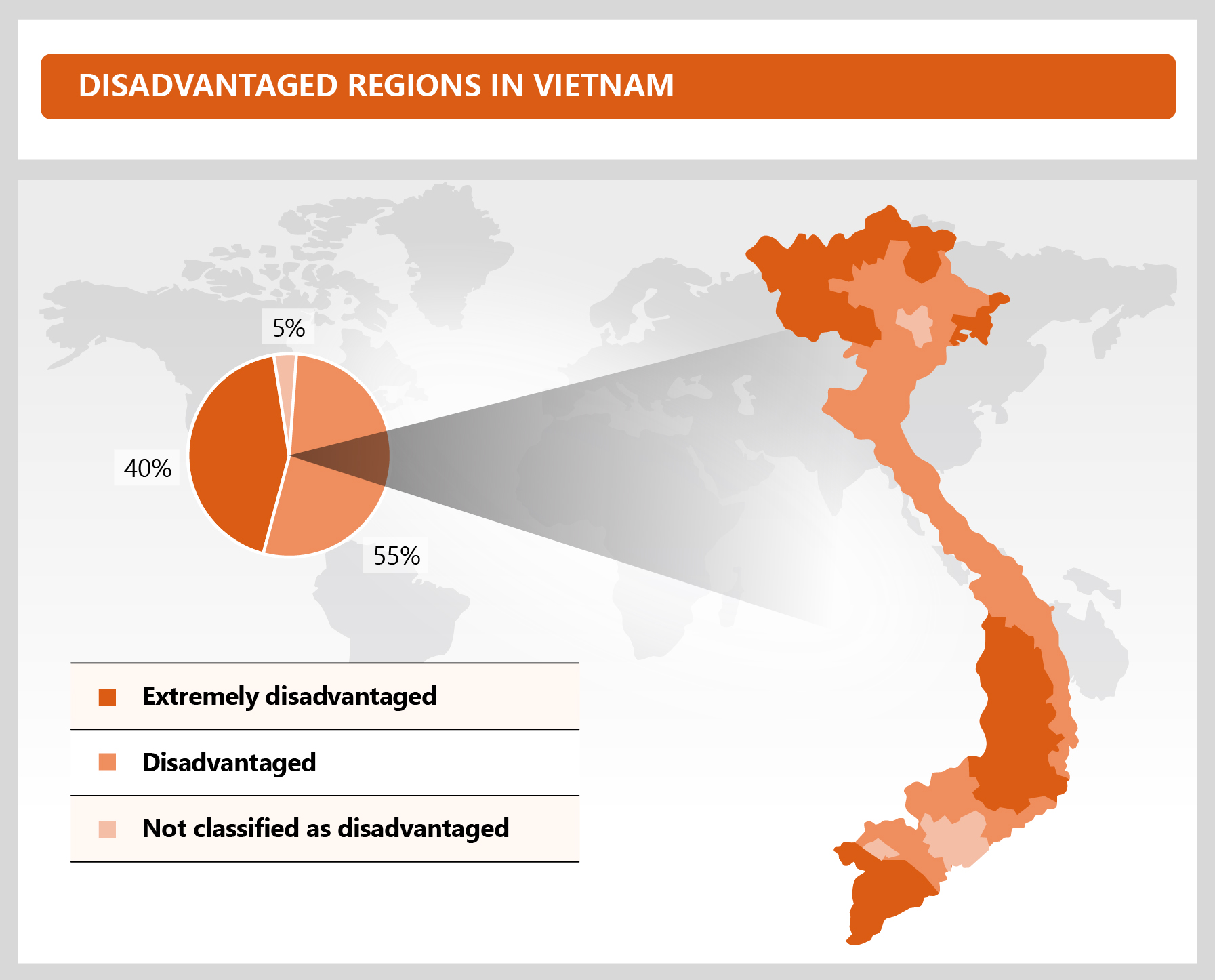 Investments in both disadvantaged and extremely disadvantaged regions benefit from preferential corporate income tax as well as tax holidays with the level of incentive directly depends on the level of disadvantage within these regions. 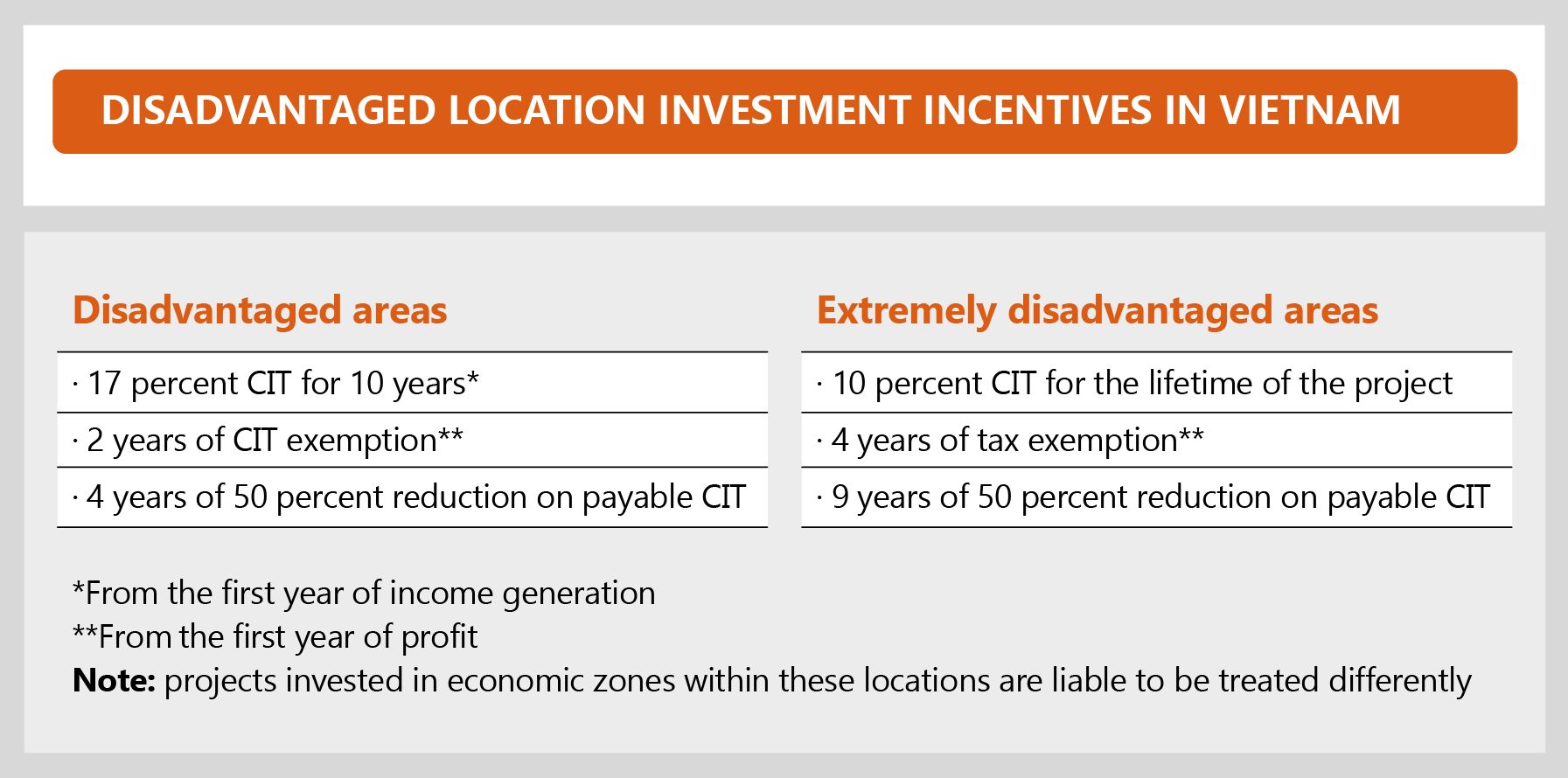
(3) Tax incentives for prioritized industries
Vietnam also offers many investment incentives for projects engaging in business lines that are highly encouraged by the government, such as high-tech industries, labour-intensive, large capital investments as well as the social important projects. The relative tax investment incentives that above projects are entitled to enjoy are shown below:
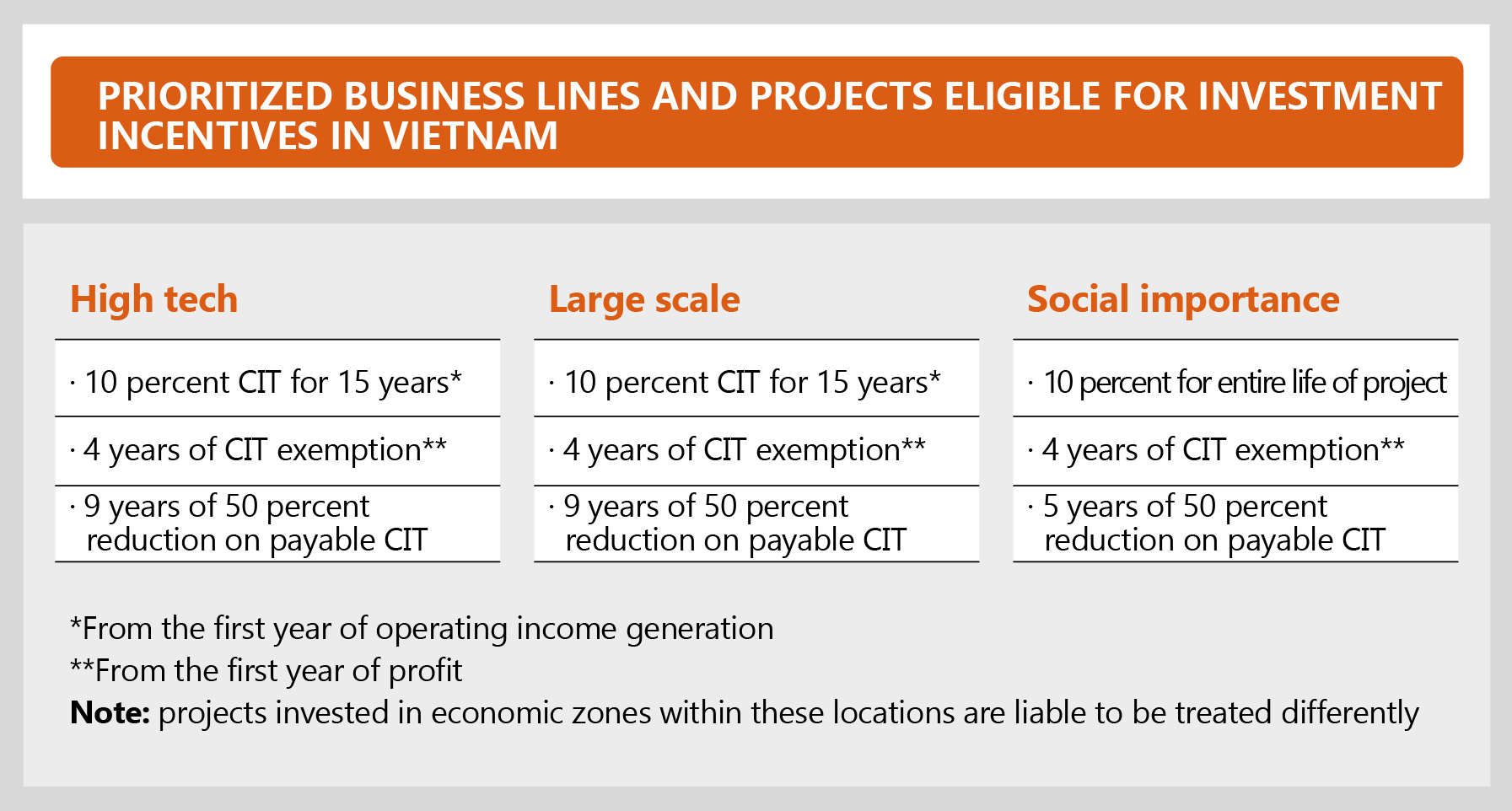
It is also worthy of note that Vietnam government has imposed numerous measures in several areas to support businesses affected by the COVID-19 pandemic. For instance, recently National Assembly of Vietnam approved a 30% reduction of CIT for the 2020 financial year. This resolution already took effect on August 3, 2020. This CIT reduction will apply to all businesses with a total revenue of less than VND 200 billion for the year 2020, including small, medium-sized businesses and cooperatives.
6. Growing Population
With around 98 million people, Vietnam ranks as the 14th largest population in the world. The population is projected to grow to 105 million by the year 2030 according to Worldometer.
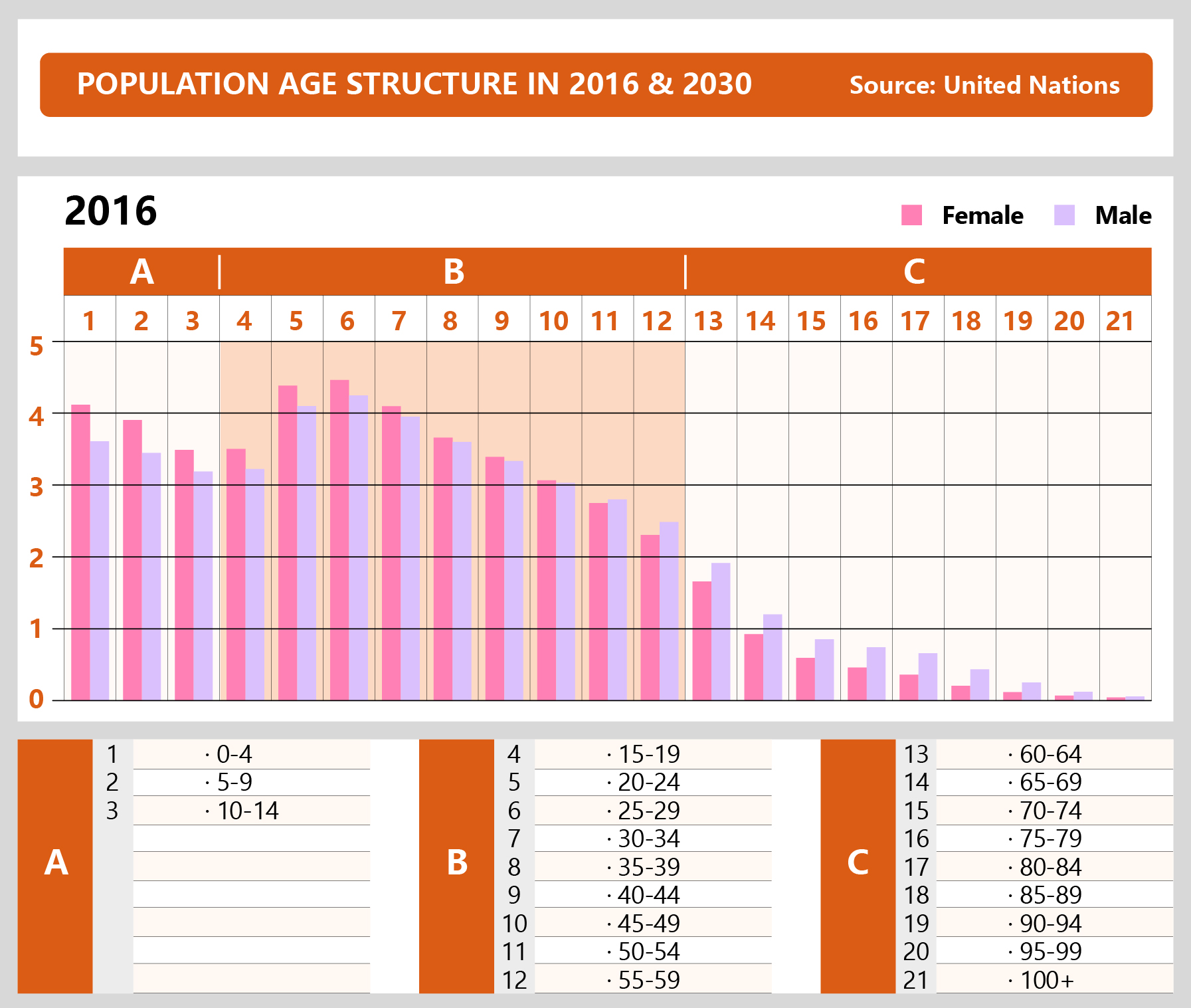
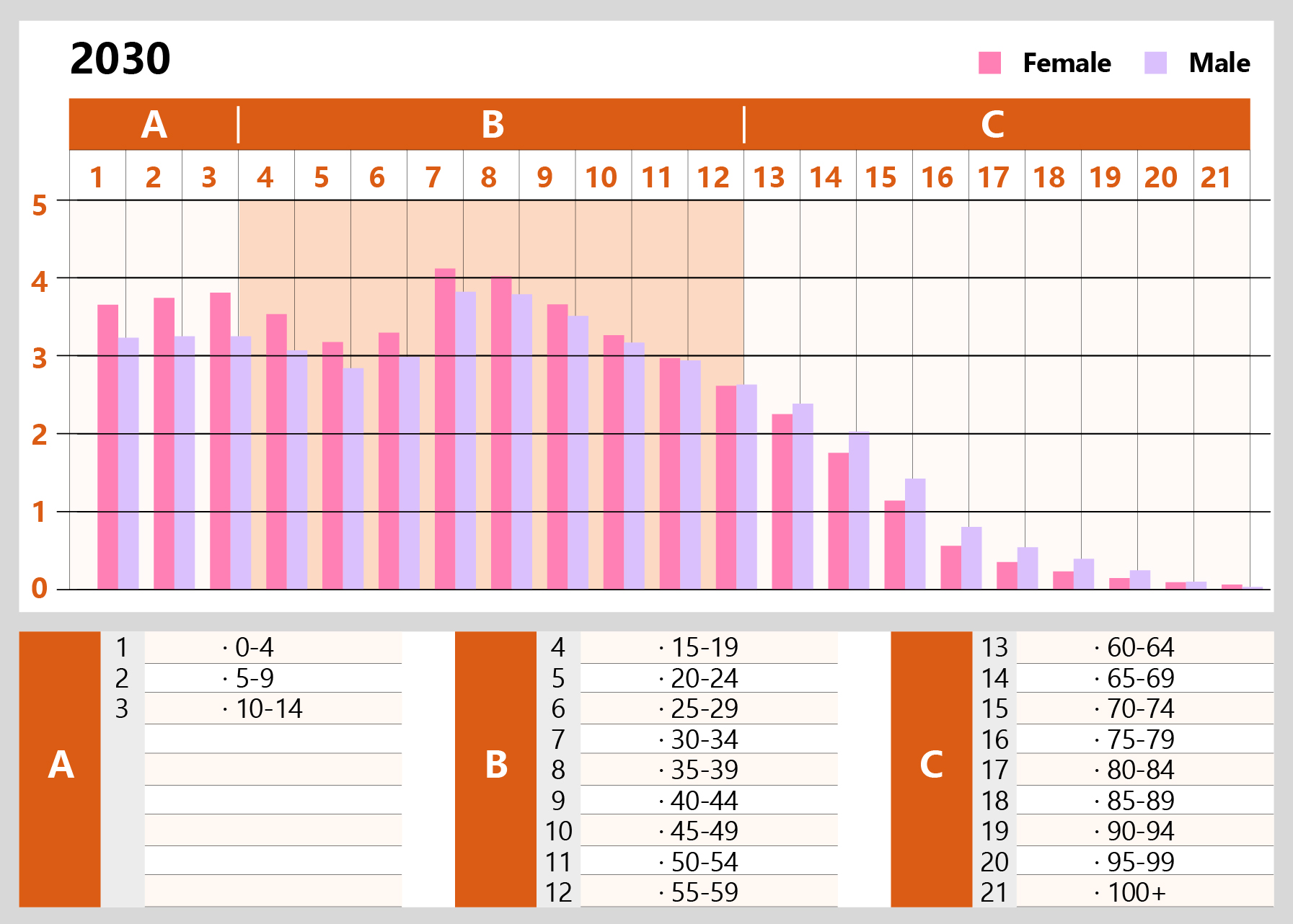
Vietnam middle class is increasing faster than any other Southeast Asian nation. Brookings Institution estimates the middle class to grow to 95 million by 2030, and with such fast-growing population and thriving economy, higher incomes and more investment opportunities are highly expected.
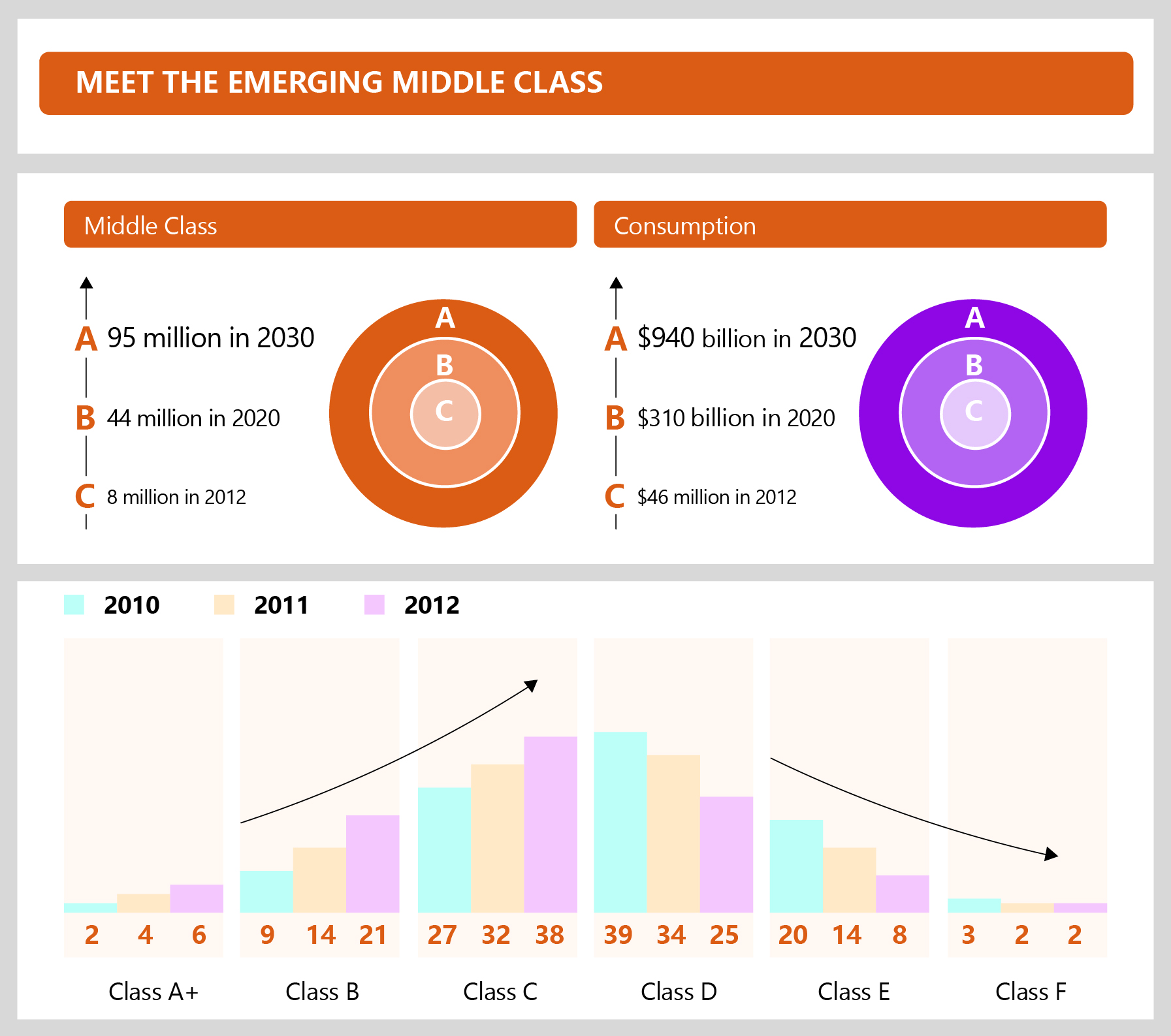
7. Rich Human Recourses - Golden Population
Human resources are vital for any country and a measure of social progress, equality, and sustainable growth. In its socio-economic development strategy, Vietnam has identified human resource development as a key to changing the growth model and a foundation for sustainable development and improvement of national competitiveness during international integration. Currently, 76% of Vietnam population are in the workforce, the third highest percentage in ASEAN. Now Vietnam is in a period of "golden population structure" with a young, high-potential workforce.
Today, Vietnamese government is promoting the educational reform, improving the quality of education with a goal to cultivating more high-quality human resources for the country. With that, Vietnam's education is becoming more and more international. For instance, Vietnamís Ho Chi Minh City is one of only 27 cities in the world that has more than 50 English-medium international schools. It currently boasts 66 schools (for preschool, primary or secondary students) that offer education in the English language and a curriculum that is relevant to an international student population. The country's other major city, Hanoi, has 36 international schools to choose from.
In the interim, Vietnam Ministry of Labor, Invalids and Social Affairs has invested heavily in vocational training schools, restructuring sectors, and adapting the vocational training programs of more developed countries. Vietnamese vocational training schools are also cooperating with enterprises, especially with foreign-invested enterprises which use modern technologies, producing higher-skilled workers who can earn higher incomes.
No doubt, the restructuring of the vocational training sector and expanding cooperation between schools and enterprises are very important keys to increase Vietnamís human resource quality. The implementation of the above measures will help to achieve the goal of Vietnamís human resource development strategy.
8. Significantly Improving Infrastructure
Infrastructure has been a key factor in Vietnamís fast-paced economic development. However, economic growth is putting greater pressure on countryís infrastructure. To address these challenges, on the one hand, Vietnamese government has expanded the investment to improve its infrastructure, including roads, airports, railways, and seaports. On the other hand, Vietnam has made a significant effort to attract foreign investment into infrastructure development by providing the overseas investors with policy support and certain preferential policies.
According to the Asian Development Bank, the country spends 5.7 percent of its GDP on improving infrastructure by year ?the highest level in Southeast Asia. Currently, there are more than 2000 kilometres of new roads in Vietnam, and the railway transportation system in Hanoi. Besides, the construction of Vietnamís first ever subway system linking the city centre with eastern districts is scheduled for completion in 2021. Meanwhile, many highway projects are also planned and underway to improve connectivity within Vietnam major cities. Regarding the airports and seaports infrastructure, by far there are 22 airports and 49 seaports, including 17 ports Type I, 23 ports Type II, 9 ports Type III and 272 berths in Vietnam.
A further detail to the Vietnamís infrastructure project given by the most recent Global Infrastructure Outlook showed that if Vietnam continues on this positive stride of investing, the country will meet 83% of its goals by 2040.
9. Rich Natural Resources
Vietnam has a considerable fresh and saltwater fauna, dense tropical forestry resources and possesses great agricultural potential. It also has an abundance of energy resources including crude oil, while gas, coal, and 41,000 km long waterways provide the basis for hydropower. Additionally, Vietnam has various mineral resources such as bauxite, iron ore, lead, gold, precious stones, tin, chromate, anthracite, granite, marble, clay, white sand, graphite, etc.
Recently, Vietnam is enhancing the cooperation with many countries in the fields of exploration, development and utilization of energy, non-metallic and metallic mineral resources. Especially, the oil and gas sector enjoy increased attention from international exploration companies.
10. Good Life Conditions and Friendly Environment
Vietnam is on the list of top 10 friendliest destinations,
according to The Daily Mail.

With its friendly atmosphere and good life conditions, Vietnam is also a great place for life. Apart from the countryís huge business opportunities and excellent investment environment, Vietnam has a quite low cost for living, nice weather and different welcome polices for foreigners who would like to move to Vietnam. Vietnamese is the official language, Chinese, French, English and Khmer are common languages, therefore you may not face the problem of language barrier in Vietnam.
Vietnam is famous with its delicious cuisine and street food culture. Compared with other Southeast Asian cuisines, Vietnamese cuisine is more refreshing, smoother, and unique. Most representative dishes in Vietnam are spring rolls, Banh Mi Thit (equivalent of a "submarine"), Bo Kho (Beef-and-vegetable stew) and Banh Xeo (Crispy Pancake). There are a lot of different types of fruit available in Vietnam, which are inexpensive, fresh, and extremely delicious.
Coffee also forms a great part of Vietnamese culture, and Vietnam is considered as a real paradise for coffee lovers. Vietnamese coffee flavour is pretty strong, you can purchase a plenty of coffee brands at relatively affordable prices there.
Life in Vietnam presents a perfect combination of a vibrant, energetic lifestyle of a fast-growing economy and the cultural and traditional heritages of a thousand-years-old culture. Local people are always eager to welcome foreigners and the atmosphere is very friendly in Vietnam. In big cities such as Ho Chi Minh City, Danang, Hanoi you can enjoy luxurious resorts, first-class medical centres, extravagant shopping malls, movie theatres as well as various types of sports and leisure centres. The daytime life in Vietnam is often eventful and exciting with many business activities, exhibitions and exchanging meetings where you can establish business relations or find new investment opportunities. The nightlife is also full of events giving you lots of opportunities to meet new friends.
If you are tired of city life, you can visit Vietnam's countryside, mountainous areas or other less travelled corners where you can just enjoy the magnificent natural surroundings, take a deep breath of fresh air, bring into your life more peace, harmony and happiness.
For more information on how to invest and set up a company in Vietnam, please refer to our Guide to Starting a WFOE in Vietnam. Kaizen will continue sharing more in-depth analysis on benefits to be invested in Vietnam for our honoured readers. Stay tuned for the upcoming Vietnam Investmentís Info!
KAIZEN Group is equipped with experienced and highly qualified professional consultants and is therefore well positioned to provide professional advices and services in respect of the formation and registration of company, application for various business licences and permits, company compliance, tax planning, audit and accounting in Vietnam. Please call and talk to our professional consultants for details.
|

